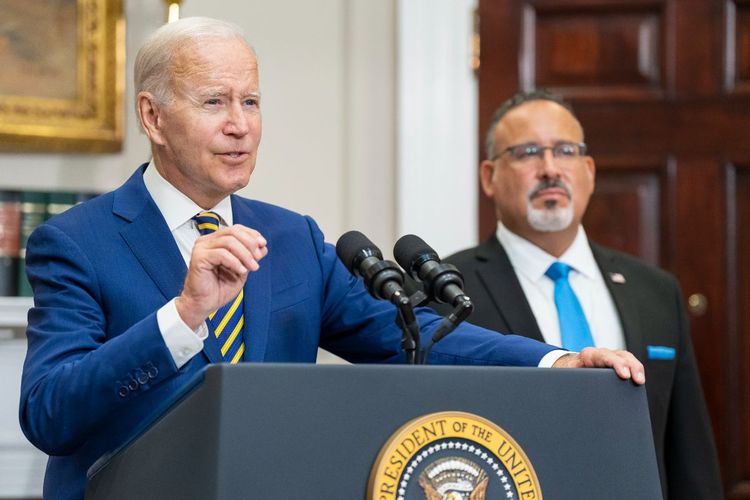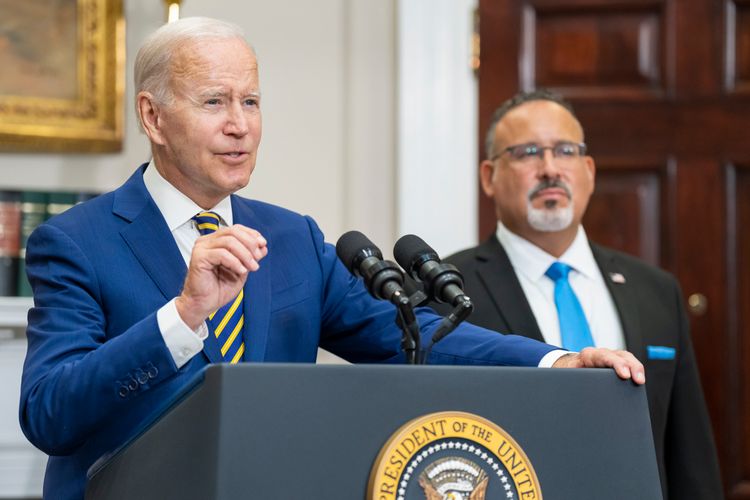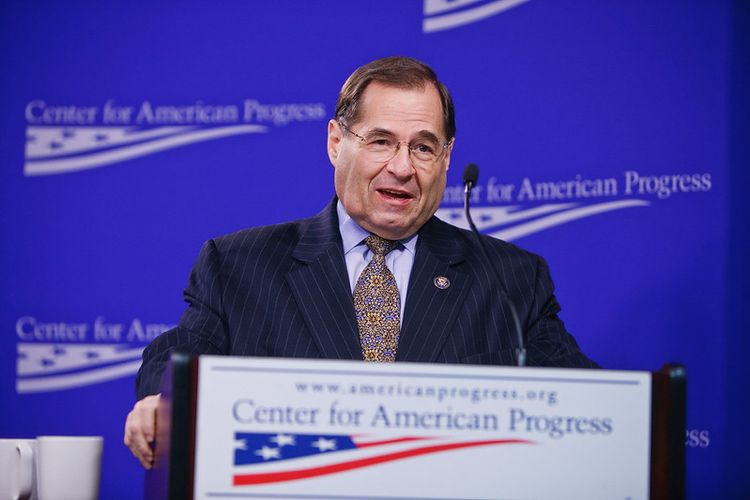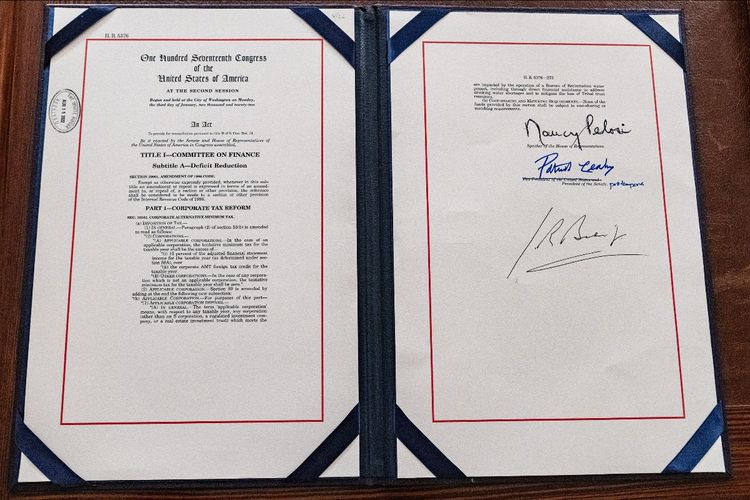Wake Up To Politics - August 12, 2022
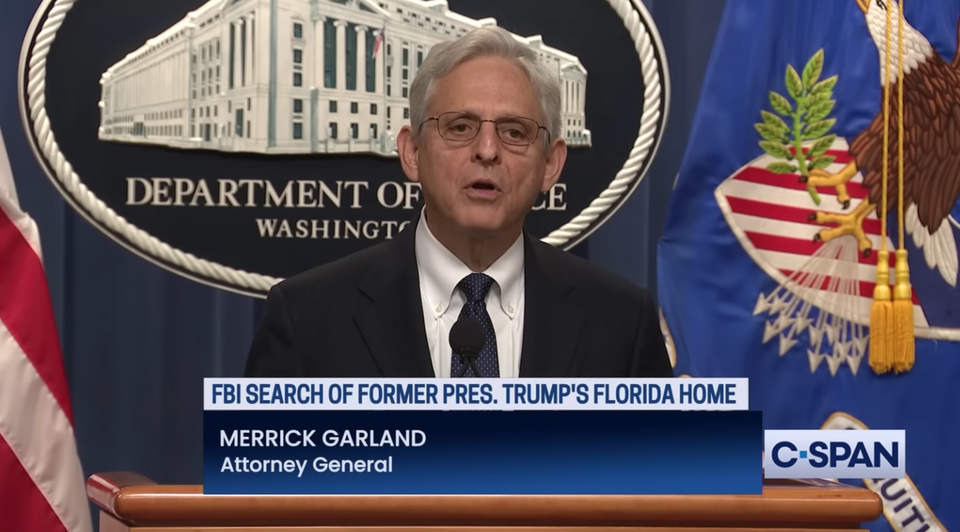
by Gabe Fleisher
Good morning! It’s Friday, August 12, 2022. Election Day 2022 is 88 days away. Election Day 2024 is 816 days away.
There’s a lot to cover in this morning’s newsletter. I’ll start things off with some, ahem, explosive new revelations in the historic investigation of former President Trump’s handling of classified documents.
Then, I’ll preview today’s House vote on one of the most significant legislative packages passed by Congress in years.
And finally, as with every Friday, I’ll recap the other bills that passed Congress or were signed into law this week, plus the new executive actions that were taken — in order to give you a true sense of what your leaders in Washington are getting done.
As always, if you feel like you’ve benefited from WUTP’s reporting this week, it’s always appreciated if you donate, buy some merch, or especially set up a monthly donation.
I can’t say enough how much your support means to me — and it makes sure that I can keep sending WUTP, and keep it free for all.
A quick programming note: I’ll be traveling on Monday, so there won’t be a newsletter that morning. I hope you have a great weekend, and I will see you back in your inbox on Tuesday.
Report: Trump took nuclear documents with him to Mar-a-Lago
Among the records the FBI was searching for at former President Donald Trump’s home earlier this week were “classified documents relating to nuclear weapons,” the Washington Post reported Thursday night.
This extraordinary detail sheds new light on the sensitive nature of the documents Trump took with him to his Mar-a-Lago estate after leaving the White House, helping explain the FBI’s decision to move forward with an unprecedented search of the former president’s home on Monday.
The New York Times added that the documents Trump kept “related to some of the most highly classified programs run by the United States.” The Justice Department was reportedly worried that leaving the documents unsecured at Trump’s estate “could leave them vulnerable to efforts by foreign adversaries to acquire them,” the Times reported.
Earlier on Thursday, Attorney General Merrick Garland broke his silence about the Trump investigation. In a brief four-minute statement, Garland announced that the Justice Department had filed a court motion to unseal the search warrant the FBI obtained before the Mar-a-Lago raid and an inventory of the items that were seized.
Trump’s lawyers now have until 3 p.m. Eastern Time today to weigh in on the motion, before magistrate judge Bruce Reinhart makes the final decision on whether the materials will be released. Trump issued a statement just after midnight endorsing their “immediate release.” (He also called the Post’s report on nuclear documents a “hoax.”)
Other details have also emerged about the investigative timeline, including that Trump was initially subpoenaed in the spring to turn over documents in his possession. His level of compliance with the subpoena is unknown. By law, all presidential records are federal property and should have been turned over to the government as soon as Trump left office.
According to the Wall Street Journal, the FBI learned this summer from “someone familiar with the stored papers” that Trump still had other classified documents at Mar-a-Lago, a revelation that likely precipitated the raid this week (and has led to widespread paranoia in Trumpworld).
Garland confirmed Thursday that he personally greenlighted the decision to seek a search warrant, which also had to be approved by Reinhart.
As Trump and his GOP allies have continued to stoke their base’s anger about the Mar-a-Lago search, one Trump supporter tried to breach the FBI’s field office in Cincinnati on Thursday.
The suspect, Ricky Shiffer, is believed to have been at the January 6 riot at the Capitol and was possibly tied to the Proud Boys; in the days after the raid at Mar-a-Lago, he posted violent messages about the FBI on Trump’s social media platform, Truth Social.
Shiffer was shot and killed after fleeing the scene.

House poised to send major climate, health, tax package to Biden’s desk
The long, twisting quest by President Biden and his Democratic deputies to usher a climate change, health care, and tax reform package through Congress is slated to reach a successful conclusion today.
The House will return briefly from its August recess to vote on the “Inflation Reduction Act,” the product of more than a year of negotiations between lawmakers on the ideological poles of the Democratic caucuses.
The package — pushed through using the reconciliation process, which cannot be blocked by a Senate filibuster — was passed by the Senate this past weekend, in a party-line 50-50 vote. Vice President Kamala Harris broke the tie.
Today’s House vote is expected to be slim as well, with Democrats controlling the chamber by only a four-seat majority. But every indication is that the measure is poised to pass.
There is a lot stuffed into the package’s 730 pages. As I’ve recapped before, the bill includes $370 billion in new spending to incentivize the production of renewable energies (like solar, wind, and hydropower) and the purchase of clean energy products like electric vehicles.
It would also allow Medicare to begin negotiating prescription drug prices with pharmaceutical companies in 2026 and cap out-of-pocket drug costs for Medicare users at $2,000 a year, long-sought changes that are expected to bring relief to millions of seniors. Enhanced Obamacare subsidies passed last year will also be extended.
The measure would be financed by raising taxes on corporations making at least $1 billion annually and by beefing up IRS tax enforcement. Democrats say the bill will raise about $300 billion more in revenue than it spends, with the leftover amount going towards deficit reduction.
The bill marks Congress’ most significant effort ever to combat climate change. Advocates hope today’s passage will be remembered as a pivot point on the issue, spurring new climate action here in the U.S. and abroad.
A report released on Thursday found that the Arctic is heating up nearly four times faster than the Earth as a whole, another sign of the planet’s warming. Scorching heat waves and torrential floods across the U.S. this summer have further underlined the changing climate’s toll.
This is the latest major legislative achievement for Biden, following recent bills to expand veterans’ health care and boost semiconductor manufacturing, as well as the bipartisan infrastructure law and Covid stimulus package passed last year.
Those might not be the LBJ-sized triumphs he promised early in his presidency, but they make for a prodigious record of achievement in an evenly divided Congress. Many of the bills have been bipartisan, although this latest package is an exception.
Once the package is sent to Biden’s desk, the race to message it to voters will begin. Republicans have criticized the measure, arguing that the new tax burden will be passed on to the middle class and decrying the planned hiring of more than 80,000 new IRS employees.
The GOP has also pointed to a study from the University of Pennsylvania’s Wharton School projecting that the “Inflation Reduction Act” would actually “slightly increase inflation until 2024” and then only barely nudge it down afterward.
Democrats, meanwhile, hope the package will allow them to run ahead of President Biden’s low approval ratings in the November midterms.
The party’s hopes have already been buoyed in recent weeks by the Kansas abortion referendum, a closer-than-expected special election in Minnesota, and polls showing first-time Republican Senate candidates flailing among voters.
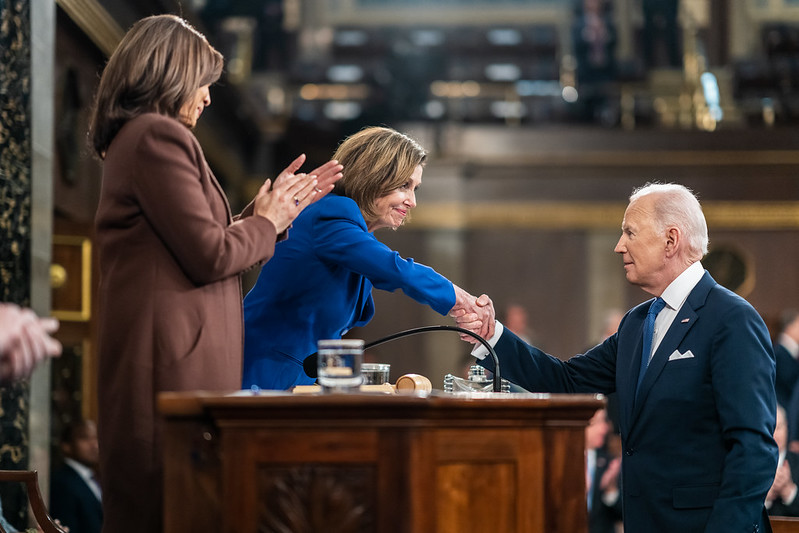
What else the U.S. government did this week
The Inflation Reduction Act isn’t the only measure that made its way through the legislative process this week. Here’s a guide to what else your leaders were working on this week:
Bills signed into law
President Biden signed two major pieces of legislation this week, both of which were long-sought bipartisan packages.
The CHIPS and Science Act authorizes $200 billion in new scientific research, while also infusing the U.S. semiconductor industry with $52 billion in new funding. Semiconductor chips are an essential component for electronic devices, from smartphones to weapons systems, but they are largely manufactured in China and Taiwan — which experts have long warned could be a national security threat down the line.
U.S. chipmakers, including Micron and Qualcomm, have already begun to announce new investments in domestic chip manufacturing in anticipation of the subsidies. Micron said its $40 billion investment will create up to 40,000 new jobs in construction and manufacturing.
The Honoring our PACT Act will allow veterans who were exposed to burn pits and other toxins during their military service to access government health care services.
Previously, veterans who developed cancers and other diseases from toxic exposure had to go through a lengthy process to prove their exposure came during their time in the military. Now, the assumption will be that it did, opening the door for more than 3.5 million veterans to gain new health benefits.
Eligible veterans can claim their benefits at va.gov/pact or by calling 1-800-MY-VA-411.
Biden also signed a treaty that would expand NATO to include the historically neutral Finland and Sweden. All 30 NATO member states must approve the treaty for it to take effect.
- The Senate (which is the only chamber that votes on treaties) ratified it 95-1-1. Read the treaty here.
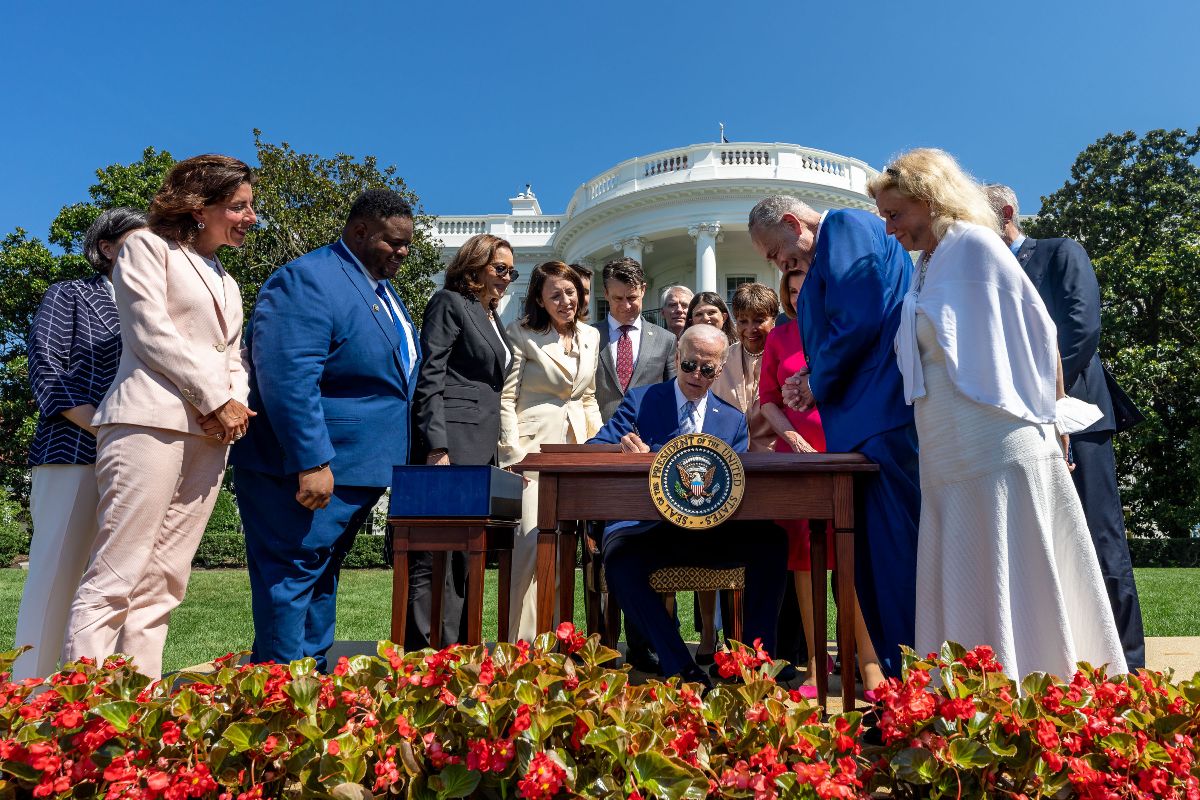
Bills passed by one chamber
The House and Senate were both out for most of the week, but when the Senate was in session Sunday to vote on the reconciliation package, it also approved two bills to combat domestic violence and trafficking:
The POWER 2.0 Act would extend a 2018 law that seeks to facilitate pro bono legal services for domestic violence and sexual assault victims. The bill requires that each judicial district in the country holds an annual summit aimed at encouraging lawyers to offer pro bono services to domestic violence victims.
In 2020, 75 such summits were held across the nation, with more than 43,000 attendees. The law is set to expire at the end of 2022; this measure would extend it permanently.
- Passed the Senate unanimously. Read the bill here.
The other bill extends authorization of the Domestic Trafficking Victims’ Fund for an additional 19 days. The fund uses fines collected from convicted human traffickers and sexual predators to finance aid for victims. Its current authorization lapses on September 11; this bill would extend it through the end of the fiscal year on September 30, when most government funding expires.
- Passed the Senate unanimously Read the bill here.
Both of these measures must now be approved by the House.

Executive actions
The CDC loosened its Covid guidelines, lifting its recommendation for people to automatically quarantine when exposed to the virus. Instead, the agency now recommends that people wear masks for 10 days after exposure, and get tested on day 5.
Guidance for schools and businesses to regularly screen asymptotic people for Covid has also been removed; schools are also no longer recommended to require exposed students to test negative in order to stay in classes. In addition, Covid guidelines are now identical for vaccinated and unvaccinated people.
The FDA greenlighted a new method for monkeypox vaccine injection. The method is known as “intradermal injection” because it allows doses to be injected between the layers of the skin, rather than beneath the skin. It only requires one-fifth as much vaccine, so five times as many doses will be able to be used to spread out the short supply.
However, the manufacturer of the vaccine has expressed concerns about the method, saying the FDA should have sought out more safety data before allowing the change. Meanwhile, the U.S. monkeypox case count has surpassed 10,000.
The Defense Department authorized $1 billion in additional security assistance for Ukraine, the 18th package of weapons and supplies the U.S. has sent to the country since August 2021 — and the largest yet. The State Department, meanwhile, sent Kyiv an $89 million package, this one for humanitarian assistance.
The Biden administration continued to distribute new funding for infrastructure projects, with the money coming from the 2021 bipartisan infrastructure law. Transportation Secretary Pete Buttigieg announced 166 projects across the country that received a collective $2.2 billion in new funding. Vice President Kamala Harris announced a $146 million investment in bringing high-speed internet to Tribal communities in New Mexico.
The Federal Trade Commission took a step toward issuing new regulations restricting how businesses collect and use consumer data. The FTC is calling for the public to comment on possible regulations before moving forward. The subsequent action would be the agency’s first major move to regulate data privacy.
President Biden announced two new judicial nominees, bringing his number of announced judicial picks to 134. Of those nominees, 76 have been confirmed so far. Biden also unveiled his appointment of Dr. Monica Bertagnolli as the director of the National Cancer Institute. Currently a professor of surgery at Harvard Medical School, she will be the NCI’s first female leader.

What’s going on in Washington today
All times Eastern. Click on an event’s time to watch it.
President Joe Biden is on vacation in Kiawah Island, South Carolina. He has no public events scheduled. According to the Associated Press, the White House has not responded to “requests to provide details on Biden’s vacation schedule, activities, or when he planned to return to Washington.”
Vice President Kamala Harris is in Oakland, California. She will deliver remarks at an event “highlighting efforts to support Oakland students and their aspirations for higher education” (2:05 pm), tour a commercial space company (3:10 pm), and deliver remarks about the Biden administration’s support for the commercial space sector (4:35 pm).
She will then fly from Oakland to her home in Los Angeles (5:40 pm), where she will spend the weekend.
White House press secretary Karine Jean-Pierre does not have a press briefing scheduled.
The Senate is on recess until September 6. The chamber will briefly convene for a pro forma session (9 am) to fulfill its constitutional obligation of meeting once every three days. No legislative business will be conducted.
The House will convene (9 am) and hold three hours of debate on the Inflation Reduction Act, the Democratic reconciliation package, followed by a final vote on the measure. The chamber is only coming in for one day before returning to its recess; accordingly, a slew of members are expected to proxy vote rather than make the trip to Washington.
House Speaker Nancy Pelosi will swear in Rep.-elect Brad Finstad (R-MN), who won a special election this week (9:20 am). Later, she will hold her weekly press conference (10:45 am).
The Supreme Court is on recess until October.
That’s it for today. If you enjoy Wake Up To Politics, it’s always appreciated if you donate to support the newsletter or buy some merch. Or if you tell your friends and family to sign up at wakeuptopolitics.com.
If you have any questions or feedback, feel free to email me: my inbox is always open.
Thanks for waking up to politics! Have a great day.
— Gabe

